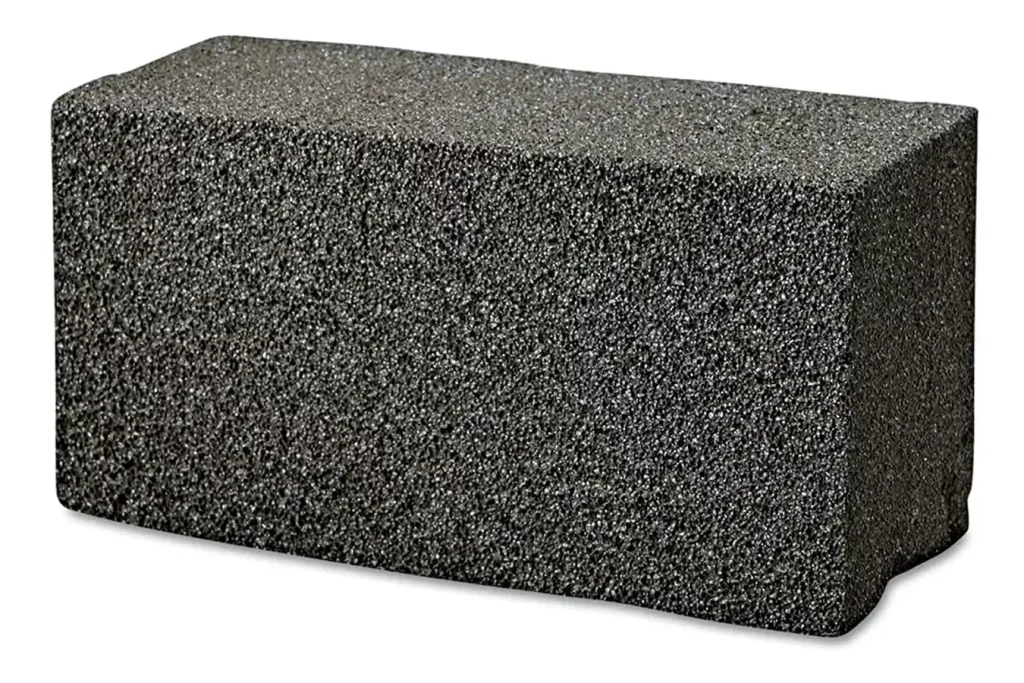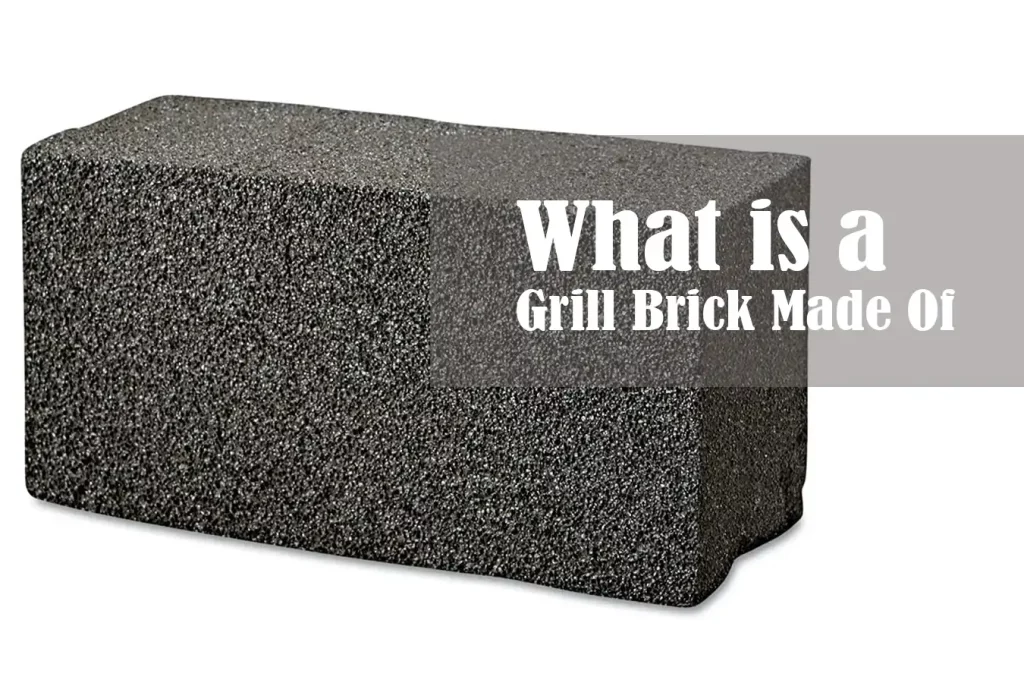Ever wondered, “what is a grill brick made of?”
Well, you're in the right place!
As an outdoor enthusiast and avid blogger, my passion for understanding each tool and gadget involved in creating those unforgettable camping meals, has led me to unravel these mysteries for you.
This article is your comprehensive guide to understanding the composition and benefits of a grill brick – an often overlooked, but crucial tool for maintaining your BBQ gear.
So get ready, as we dive into the intricacies of this BBQ mainstay.
Expect to be enlightened and excited, as we embark on this informative journey together.
Understanding Grill Bricks
So, what exactly is a grill brick? A grill brick is a block of abrasive material, often pumice stone, used for heavy-duty cleaning of grills and griddles without leaving scratches or harmful residues.

General Uses of Grill Bricks
Grill bricks come to the rescue after every BBQ party when the grill grates are laden with the remnants of your culinary escapades. They work wonders on all types of grills: gas, charcoal, flat tops, you name it! And they're not just for grills. Got a griddle or a pizza stone? A grill brick will do the trick there too!
Now, I know what you're thinking – why not just use a grill brush or some other cleaning tool? Well, that's a fair point. Grill brushes do a decent job too, but grill bricks have their own advantages. They're much more durable, for one, and they're excellent for heavy-duty cleaning jobs that a brush just can't handle. Plus, they're super easy to use. Just rub the brick on the grates, apply a bit of elbow grease, and voila – your grill is as good as new!
Learn more: How to Use a Grill Brick
The Benefits of Using Grill Bricks for Cleaning
Now let's talk benefits. Remember the last time you had a fantastic BBQ party, only to find your grill grates looking like a battlefield the next morning? That's where grill bricks come in. They're gentle on your grates but tough on grime, ensuring your grill gets a deep clean without any damage.
And it's not just about cleanliness. Regularly cleaning your grill with a grill brick can actually extend its life, meaning more delicious BBQ parties for you and your friends. Plus, a clean grill means better heat distribution and fewer flare-ups, which translates to tastier, more evenly cooked food.
Grill bricks also win points for safety. Ever heard those horror stories about wire grill brushes leaving bristles behind that can end up in your food? Yikes! No such worries with grill bricks.
The Composition of a Grill Brick
Understanding what grill bricks are made of not only satisfies curiosity but can also help us appreciate how effectively they do their job. Grill bricks, despite their simple appearance, have a composition that's quite fascinating.
The Main Material Used in Grill Bricks
Grill bricks are primarily made of a light, porous volcanic rock known as pumice. Have you ever seen a stone that floats on water? That's pumice for you! Formed when hot, lava-rich in gases cools rapidly, pumice contains numerous tiny bubbles trapped within its structure, making it lightweight yet abrasive – a perfect combination for our grill-cleaning needs.
Pumice is also incredibly durable and can withstand high temperatures, which is, needless to say, essential for any grill cleaning tool. Its porous structure makes it a perfect scrubber, capable of dislodging even the most stubborn burnt-on food and char without scratching your grill grates.
In short, a grill brick is typically made of a combination of abrasive materials, primarily pumice or other volcanic rocks, which effectively clean grilling surfaces.
Any Additional Materials or Binding Agents (if applicable)
Now, depending on the manufacturer, some grill bricks may also contain a binding agent to maintain the brick's shape and durability. This could be a natural resin or even a type of cement. However, the content of these additional materials is minimal and does not interfere with the cleaning action of the pumice.
Why are Grill Bricks Made from These Materials?
The composition of grill bricks isn't accidental; there are compelling reasons why these materials are used.
The Advantages of the Primary Material
Pumice, being a natural stone, is non-toxic and environmentally friendly. Its heat resistance allows it to be used on warm (not hot) grill grates, making cleaning easier as warm grates can help to loosen grease and grime.
One unique advantage of pumice is its ability to shape itself to the surface it's cleaning. When you start using a new grill brick, it wears down to match the grooves of your grill grates, making subsequent cleanings more efficient.
How These Materials Contribute to the Effectiveness of Grill Bricks
The composition of grill bricks, mainly pumice, contributes significantly to their effectiveness. The porous and abrasive nature of pumice makes it a formidable opponent to burnt-on grease and char, helping to maintain the cleanliness and longevity of your grill.
Binding agents, while not directly involved in cleaning, ensure the grill brick retains its shape and can withstand repeated uses, adding to the overall effectiveness and durability of the brick.
In a nutshell, grill bricks are a product of nature and a bit of human ingenuity, coming together to create an effective, non-toxic, and durable cleaning tool for our beloved grills.
How Grill Bricks are Made
Grill bricks, while simple in their design, undergo a meticulous production process to ensure they're ready to tackle your grilling mess. Let's take a closer look at how these helpful cleaning tools come to be.
Brief Overview of the Manufacturing Process
Step 1: Gathering and Processing the Materials
The process starts by sourcing pumice stone, the primary material of a grill brick. This naturally occurring volcanic rock is abundant in certain areas around the world, including the United States, Italy, and Greece. The raw pumice is then ground into a fine powder.
Step 2: Molding and Shaping the Grill Bricks
Next, the ground pumice is mixed with water and any necessary binding agents. This paste-like mixture is then molded into the familiar brick shape we recognize. The molded bricks are then dried until they are completely moisture-free, creating a light but hard final product.
Step 3: Packaging and Distribution
Once the grill bricks are dry and hard, they are packaged and prepared for distribution. Grill bricks can be found in various retail outlets, including kitchen supply stores, general merchandise stores, and online marketplaces.
The Role of Each Material in the Manufacturing Process
Pumice, the star player in a grill brick, is key for its abrasiveness, while its porous nature enhances the cleaning ability of the grill brick. Any added binding agents help maintain the brick's form and durability, ensuring that it doesn't crumble during use.
Comparing Grill Bricks to Other Grill Cleaning Tools
When it comes to grill cleaning, there are several tools available, each with its own merits and demerits. Let's see how grill bricks stand up against them.
Comparison of Materials Used in Grill Bricks vs. Other Grill Cleaning Tools
Grill brushes often use stainless steel or brass bristles, while grill stones can be made from a variety of materials, like pumice (like grill bricks) or heat-treated glass. Grill bricks are unique due to their singular focus on pumice, a material that is both effective and safe for your grill grates.
Pros and Cons of Grill Bricks in Relation to Other Tools
On the plus side, grill bricks are non-toxic, eco-friendly, and highly effective at removing stubborn grime. They're also safe to use on almost all grill surfaces.
However, grill bricks aren't without their drawbacks. They can wear down relatively quickly compared to other tools. Plus, they require a bit of elbow grease, which might be a downside for some.
Despite these cons, many BBQ enthusiasts swear by the grill brick, enjoying the thorough clean it provides. At the end of the day, the best grill cleaning tool for you will depend on your specific needs, grill type, and personal preferences.
Safety Considerations When Using Grill Bricks
Using a grill brick can be a simple and effective way to keep your grill grates clean, but it's essential to understand how to use them safely to avoid any unnecessary risks.
How the Material of the Grill Brick Affects Its Safe Use
Grill bricks are typically made from pumice, a naturally occurring, non-toxic stone. While pumice is a safe material, it can create a fine dust during cleaning. It's recommended to dampen your grill brick with a little water before use to minimize dust production.
General Safety Tips for Using Grill Bricks
Always dampen your grill brick before using it to help prevent the creation of pumice dust. If you have sensitive skin, consider wearing gloves to prevent irritation. Lastly, avoid applying excessive force when using your grill brick to prevent damaging your grill grates.
FAQs about Grill Brick
What is in a grill brick?
A grill brick is primarily made from ground pumice stone, a naturally occurring volcanic rock, which may be mixed with a binding agent for added strength and durability.
Are grill pumice stones safe?
Yes, grill pumice stones are safe to use. However, they can create dust during use, so it’s advisable to dampen the stone with water before cleaning to minimize this.
Can you use a grill brick on a Blackstone?
Yes, you can use a grill brick on a Blackstone griddle. It’s a great tool for effectively removing stuck-on food and residue without damaging the cooking surface.
How do you clean a charcoal grill with brick?
To clean a charcoal grill with a grill brick, ensure the grates are cool to the touch. Wet the grill brick slightly, then rub it over the grates to remove residue and stuck-on food. Always rinse the grates thoroughly after cleaning to remove any pumice dust.
Conclusion
Grill bricks, with their unique composition of ground pumice and occasional binding agents, offer a safe, effective, and environmentally friendly solution for cleaning grill grates. As grill lovers, we all appreciate the tantalizing tastes that a clean grill can provide.
So next time you fire up your grill, remember the humble grill brick and the important role it plays in maintaining the cleanliness of your grill. Happy grilling!
Read next: How to Grill Chicken Leg Quarters on Charcoal Grill


